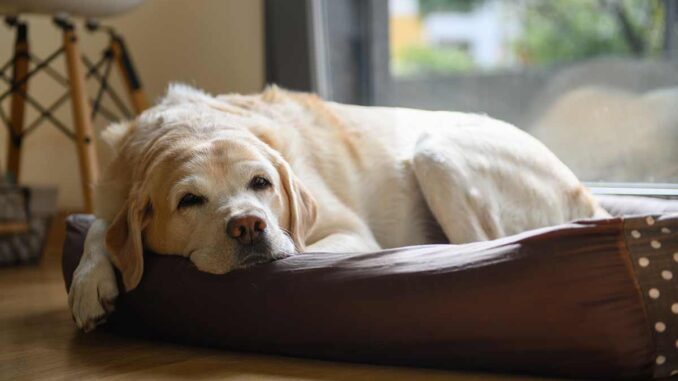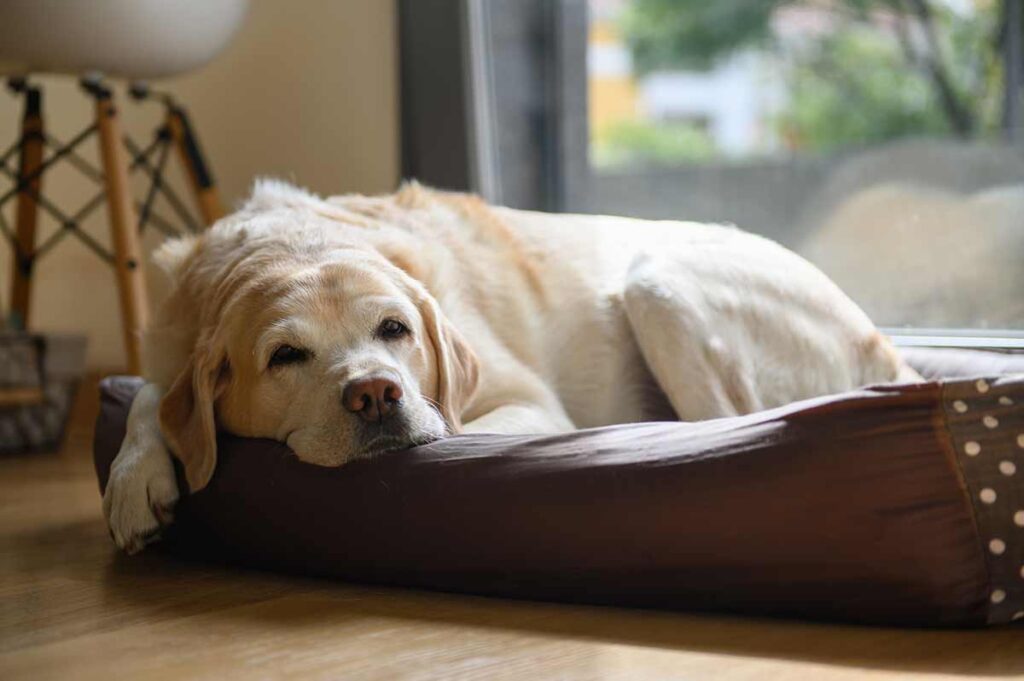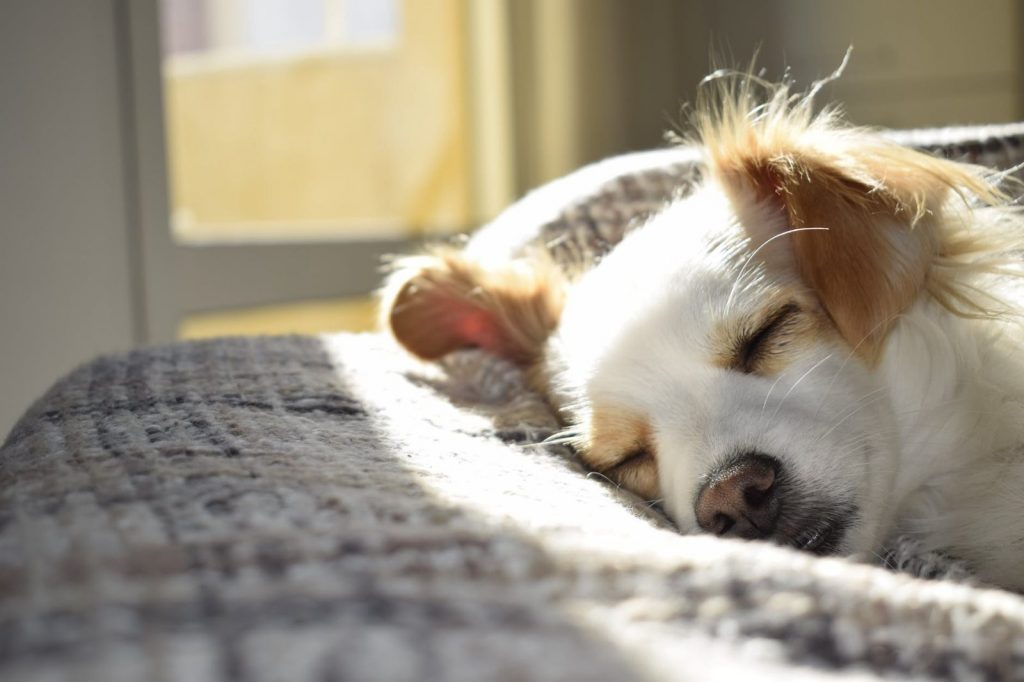
This article was updated on December 18th, 2021
Your furry canine friend might not sleep as well with older age. Owners with old dogs often report that their dogs become restless and frequently wake up in the middle of the night. And this disturbance in the sleep of your dog can affect not only your old friend but the whole family. If you are the owner of an old dog suffering from this problem, you have come to the right place to find the solution.
There is no elixir or one-step formula to solve the issue of an old dog who is restless at night. When your older dog wakes up and gets up in the middle of the night, most of the time, it is not because he’s been woken up by a an outside noise. There could be behavioral, cognitive, or environmental reasons.
Why is my old dog restless or waking up at night?

Let’s have a look at the most common reasons to help you identify the measures and practical steps you can take to improve your furry friend’s good night’s sleep.
Main reasons your dog is not sleeping well
Dementia
Like older adults, old dogs can also get dementia, and the major symptom of this disease is not getting sound sleep at night. Changes in the sleep-wake cycle are a common sign of dementia, and most dogs will show signs like nighttime anxiety or increased energy at the wrong time of day.
When your senior dog wakes up at night with baffled eyes and has no idea about the surrounding, it is a cue that your dog might be suffering from dementia. When your dog is astonished after waking up, visit your vet to verify the diagnosis and figure out the next steps. To learn more about dementia, visit our page on the “old dog syndrome”.
Pain
At night, there are often no distractions or noise. Your dog may not be able to sleep because of pain. Older dogs with cancer can experience swelling that will cause pain.
Dogs that have experienced a severe injury in the past (even many years ago) can also experience pain. The wound might have healed, but your old dog might still experience the consequences, in particular in old age. You can gently inspect the wound and find out if the dog shows signs of restlessness or tries to avoid your touch in that particular area. If that is the case, pain is probably the reason why your old dog is restless at night. To learn more about managing pain, visit our owner’s guide to Dog Pain Relief.
Changes in environment
Various environmental factors could create stress for your dog, which could result in waking up in the middle of the night. For example, if you have moved to a new house or if there is a new member in the house (a baby or another pet), your dog might become uncomfortable and stressed. Similarly, new sounds or changes to the immediate environment of your dog can also create various problems for your furry friend.
Temperature fluctuations
Dogs do not sweat like humans or other mammals. Young dogs can effectively regulate their body temperature, but old dogs have a harder time regulating their body temperature. Check for conditions that could create cold or hot temperature fluctuations in the room where your dog sleeps. Adjusting the thermostat or giving a blanket to your dog can sometimes solve this issue.
How to help your old dog sleep better
If your old dog is waking up at night and being restless, there are some simple tips and tricks that will help you calm your older dog for a better night’s sleep. You can follow any single or combination of these tips to help your dog fall sound asleep every single night.

Follow the same routine
It is important for an older dog to follow the same daily routine. When a dog grows old, a routine becomes like a ritual, and any change in the routine can affect your dog both during the day and during the night. When your dog is getting older, you must adjust accordingly. Keeping the same eating and playing habits will help you and your dog get a better night’s sleep every day.
Maintain regular exercise
When dogs exercise daily, they tend to get more tired at night and sleep better. If you make sure that your senior dog gets regular exercise, based on his abilities, you will likely help him sleep better. Exercising an older dog is an important part of their care, but it can be challenging to know how much is enough, or how much is too much. Read our page on The Importance Of Exercising Older Dogs.
Don’t forget mental exercise
Continue to provide mental stimulation to tire out your dog and help stave off the signs of dementia. ‘Sniffaris’ and dog food puzzles are ways to encourage your dog to use his brain more – much like the elderly are encouraged to do Sudoku to keep them mentally flexible.
Help your dog with pain
If your dog is uncomfortable or in pain at night, you should consider pain relief medication and solutions to help him sleep through the night with minimal pain. We recommend reading our page on pain relief for older dogs by Dr Joanna De Klerk.
Use a nightlight
If your dog wakes up confused about her surroundings because of cognitive issues, she will get anxious in the dark. Adding a night light in the sleeping area of your furry friend can make things far better. When you add a nightlight in the sleeping area, your dog is less likely to leave the bed or sleeping place even after waking up because the light will make her feel more relaxed and comfortable.
Consider music
Music is not only the food of the human soul. Research also shows strong evidence that music has a positive influence on the behavioral traits of dogs (Source: Musical Dogs: A Review of the Influence of Auditory Enrichment on Canine Health and Behavior). Music can help release their stress. If you find that your senior dog wakes up with anxiety in the middle of the night, playing soothing music may help your dog relax. Music can also help your dog fall asleep.
Change the bed’s location
Sometimes, older dogs start to become insecure and will want to stay by your side all the time. At night, the urge to stay with the master can make the dog wake up at night and become restless. When you feel that your dog needs your sense, touch, or presence, you should consider getting your dog closer to your sleeping area. It will help both you and your pup have a good night’s sleep.
Change your dog’s bed
Your dog may not feel comfortable in the sleeping area because of medical issues or old age. Buying a comfortable dog bed will help make things better. Old dogs that experience pain or other physical issues might love to spend the whole night on a more comfy and cosy bed. See our article on the Best Senior Dog Beds.
Play a little game
If your dog wakes up in the middle of the night full of energy, playing with your senior pet with a dog toy help release the energy, and will also help your dog get mental exercise. The mental and physical work will make your dog feel more comfortable, and help you tuck the dog in and go back to bed.
Conclusion
Your veterinarian can help you make the best decisions to find out why your older dog might be restless at night. But before going to the vet, you can experiment with the tips and tricks explained earlier to help calm your dog at night. If the problem persists and your dog continues to wake up at night, you should consult your veterinarian: medical conditions including insomnia and apnea can be diagnosed and treated with medicine. In the past few years, owners and veterinarians tend to use nutraceutical medicine to get the best results with few side effects on their furry friends.
Learn more about caring for your old dog:
Disclaimer: This website's content is not a substitute for veterinary care. Always consult with your veterinarian for healthcare decisions. Read More.


Be the first to comment